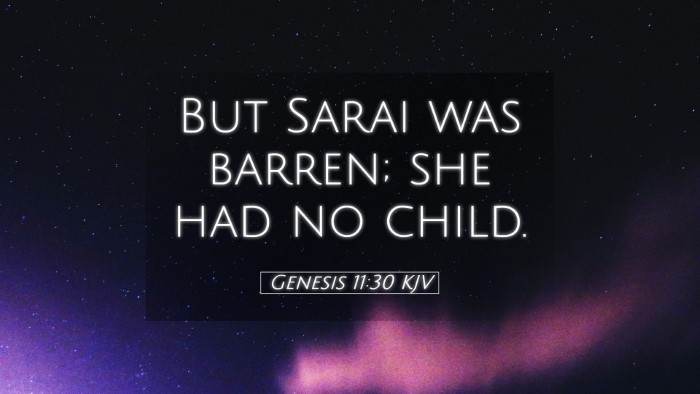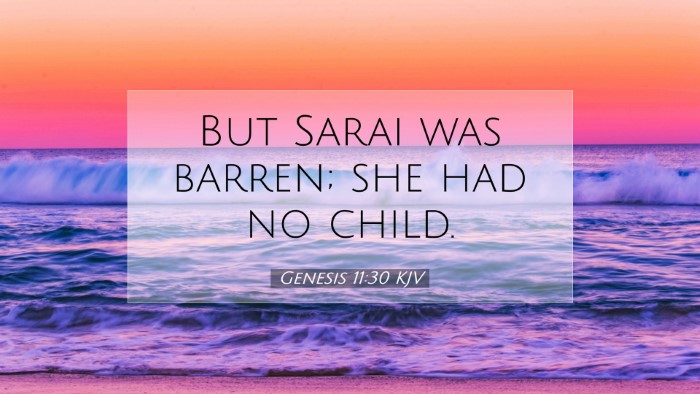Commentary on Genesis 11:30
Genesis 11:30 states: "But Sarai was barren; she had no child." This verse is pivotal, as it introduces a significant limitation in the life of Abram and Sarai while also setting the stage for God's miraculous intervention. The barrenness of Sarai is not merely a biological fact, but it serves as a theological milestone in the narrative of God’s covenant with Abraham.
Introduction to Sarai's Barrenness
The mention of Sarai's barrenness highlights important themes of faith, promise, and the challenges faced by those who are called by God. It emphasizes human frailty in contrast to divine sovereignty. As Albert Barnes notes, God's plans often often operate under conditions that appear impossible, serving to magnify His power when fulfillment occurs.
Theological Implications
The barrenness of Sarai is more than a personal struggle; it speaks to the broader narrative of salvation history. Adam Clarke articulates that Sarai’s inability to bear children sets a stark backdrop against the promise of descendants that God will later make to Abram. Here are some implications to consider:
-
Divine Sovereignty: God's ability to grant life even in barrenness highlights His sovereignty over the natural order. As seen later in the story, God will intervene to fulfill His promise, demonstrating that nothing is too difficult for Him (Jeremiah 32:27).
-
Faith and Trust: The experience of barrenness is a common theme in Scripture and often serves as a test of faith. It calls upon individuals to trust God’s timing and purpose, a tenet vital for every believer.
-
Preparation for God's Work: Barrenness can also be indicative of a period of preparation. Just as God prepared Sarai for a future role in His plan, believers must consider their own challenges as part of divine preparation.
Sarai: A Woman of Faith
Sarai’s character arc throughout the Genesis narrative evolves significantly from this point. While presented as barren, Sarai is later depicted in a manner that exemplifies resilience and faith. Matthew Henry provides valuable insights into her demeanor; despite her barrenness, she remains a key figure in God's covenant narrative.
Sarai's Role in God's Plan
Sarai’s eventual fulfillment as a mother of nations through the miraculous birth of Isaac underscores the transformational power of God. Her story ultimately serves to inspire faith in others facing seemingly insurmountable obstacles.
Contrast with Human Understanding
Humans, characterized by their limited perspective, often view barrenness through a lens of despair. Adam Clarke points out that this perception places a veil over the understanding of God’s larger narrative where barrenness can become a vessel of blessing and fulfillment.
The Narrative Paradox
In biblical narratives, God's promises often emerge amidst apparent contradictions. Sarai's barrenness being central to the promise of descendants creates a paradox that invites deeper reflection on the nature of faith and divine intention.
Lessons for Modern Believers
For pastors, students, and theologians, Genesis 11:30 offers rich theological and practical lessons:
-
Endurance in Trials: The example of Sarai teaches modern believers the importance of faithfulness amidst personal trials. Her story is a testament that God’s timing is not confined to human expectation.
-
Embracing God’s Plans: Sarai's initial response to her barrenness was one of human desperation. This teaches that believers must relinquish their own solutions and embrace God’s plans, often beyond human comprehension.
-
Hope in the Unexpected: Sarai's eventual motherhood reaffirms hope. For those in ministry, sharing stories of hope where none seems possible can be a powerful instrument for encouragement.
Conclusion
Genesis 11:30 is more than a statement of physical incapacity; it is a profound declaration of the potential for divine intervention in the midst of human weakness. Through the lens of public domain commentaries, we see Sarai's story as an integral part of God’s larger narrative—a narrative that reveals His power to transcend human limitations. The barrenness of Sarai invites every believer into a journey of faith, expectancy, and trust in God’s promises despite the challenges that may lie ahead.


